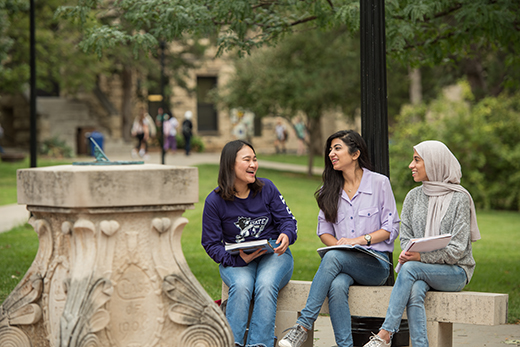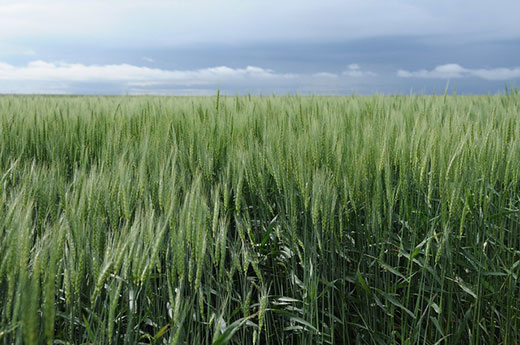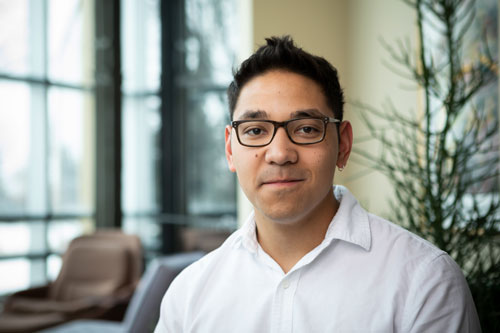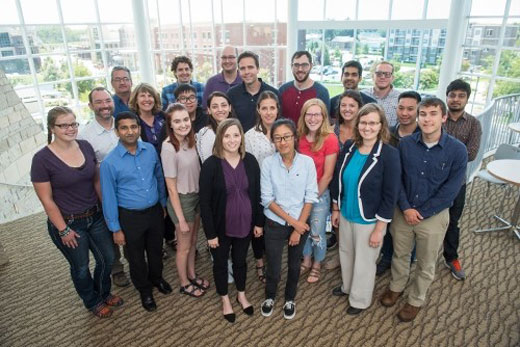09/25/19
K-State Current - September 25, 2019
K-State Current is a weekly news update for the Kansas Board of Regents to apprise the Regents on a few of the many successes and achievements made by K-State faculty, staff and students.

K-State News
Kansas State University again recognized with HEED Award for championing diversity, inclusion
 Kansas State University is again earning national recognition as one of the top higher education institutions for diversity and inclusion.
Kansas State University is again earning national recognition as one of the top higher education institutions for diversity and inclusion.
Insight Into Diversity magazine has awarded the university with the 2019 Higher Education Excellence in Diversity, or HEED, Award. K-State has received the award every year since 2014. The university is one of 94 higher education institutions selected this year for the national honor and the only Kansas institution to receive the designation.
"Kansas State University's mission as a land-grant university encourages diversity and learning opportunities created through societal differences," said Richard Myers, K-State president. "As we embrace our differences, we create a harmonious workplace and educational institution of choice. "Being a 2019 HEED Award recipient symbolizes that we remain true to our mission."
The Insight Into Diversity HEED Award, open to all colleges and universities across the U.S. and Canada, measures an institution's level of achievement and intensity of commitment in regard to broadening diversity and inclusion on campus through initiatives, programs and outreach; student recruitment, retention and completion; and hiring practices for faculty and staff.
"Kansas State University is continuously moving forward together with our students, faculty and staff toward inclusive excellence," said Bryan Samuel, chief diversity and inclusion officer at K-State. "One of the most impactful endeavors we can achieve universitywide is to employ a diverse and engaged workforce and recruit and retain a diverse and engaged student body. Inclusiveness creates growth, so as we unlock our potential and manage differences, we create a harmonious workplace and educational institution of choice."
K-State's dedication to diversity and inclusion can be traced back to the university's founding in 1863. The university then, as now, provided full educational privileges with open enrollment to all students, regardless of gender, race or creed. Samuels said this dedication has continued to grow over the university's 156 years, as evidenced by the many diversity and inclusion initiatives offered today, highlighted by the KSUnite movement established in November 2017.
"KSUnite encourages individuals to discuss how to develop an inclusive community, have meaningful conversations and respond to healthy discussion," Samuels said.
This year's KSUnite will be Wednesday, Nov. 6.
To attract a diverse and inclusive student body, K-State invests in many programs such as Project IMPACT, which is designed to recruit, retain and graduate multicultural and first-generation students. Other programs offered by the university, such as the First Scholars, McNair Scholars and Developing Scholars programs, PILOTS and the Women in Science and Multicultural Engineering programs, also assist with the academic success and retention of students from underrepresented and multicultural backgrounds.
In addition, K-State's Office of Diversity and Multicultural Student Affairs, home to Project IMPACT, assists with intercultural learning to build a more inclusive K-State family and promotes a strong multicultural student life, including through organizations such as the Hispanic American Leadership Organization and the Black Student Union, which has been named best in the Big 12 Conference.
K-State's LGBT Resource Center, which serves students, faculty, staff and community members, was recently made part of the Office of Diversity and Multicultural Student Affairs and has helped K-State be recognized as a Top 25 school in the nation for LGBTQ inclusion in policies, programs and practice by Campus Pride. K-State also is one of the Top 30 schools in the nation for being LGBTQ friendly.
Among K-State's other diversity and inclusion initiatives include the President's Commission on Multicultural Affairs and the appointment of diversity point people in each K-State college and at the K-State Libraries.
The HEED Award is just one of many recent honors K-State has received for diversity and inclusion. In 2018, the university also was named the No. 2 college town in the nation by Livability.com and was on Business Insider's Top 20 Best College Towns list. K-State has received the Campus Pride Best of the Best LGBTQ Friendly Colleges and University award for three consecutive years, the Insight into Diversity Inspiring Programs in STEM Award in 2018, College Choice's 50 Best Colleges for LBGTQ Students in 2017, The Advocate magazine's Top 10 Trans-supportive Colleges in the U.S. in 2017, and a Compete Sports Diversity Award in 2017.
Council for Advancement and Support of Education selects Greg Willems to serve on national committee
 Greg Willems, president and CEO of the Kansas State University Foundation, has been selected to serve on the 18-member Council for Advancement and Support of Education (CASE) National Committee for Institutionally Related Foundations.
Greg Willems, president and CEO of the Kansas State University Foundation, has been selected to serve on the 18-member Council for Advancement and Support of Education (CASE) National Committee for Institutionally Related Foundations.
The national committee provides leadership and guidance to CASE on issues related to the operations of institutionally related foundations and the distinctive professional development resources for foundation professionals who serve higher education institutions across the United States. Willems’ three-year board term began July 1, 2019.
“Under Greg’s leadership the KSU Foundation has flourished, garnering a reputation as one of the most efficient and effective institutionally related foundations in the country,” said Steve Lacy, KSU Foundation board chair. “His selection for the National Committee for Institutionally Related Foundations is a natural choice.”
Willems has led the KSU Foundation since February 2015. In that time, the foundation has been recognized with CASE’s Fundraising Award for growth in fundraising and innovation toward student success, faculty development, facility enhancement and programmatic achievement; launched the award-winning K-State Family Scholarship match fund program to increase scholarships on campus and help make K-State more accessible and affordable to students; twice exceeded the Innovation and Inspiration Campaign’s fundraising targets; celebrated the first named college in the university’s history; and earned certification as a Great Place to Work. Also during that time, the KSU Foundation’s Board of Directors was honored with the AGB John W. Nason Award for Board Leadership.
As Kansas State University’s strategic partner for philanthropy, the KSU Foundation inspires and guides philanthropy toward university priorities to boldly advance K-State family. The foundation is leading Innovation and Inspiration: The Campaign for Kansas State University to raise $1.4 billion for student success, faculty development, facility enhancement and programmatic success.
K-State Faculty Highlights
K-State and collaborators double down on making water, nutrients go further on Southern Plains farms
 Kansas State University is leading a multi-agency team focused on improving water and nitrogen use efficiencies and improving soil health in the semi-arid southern Great Plains.
Kansas State University is leading a multi-agency team focused on improving water and nitrogen use efficiencies and improving soil health in the semi-arid southern Great Plains.
The nearly $10 million five-year research effort is led by K-State University Distinguished Professor Chuck Rice and includes a transdisciplinary team from the U.S. Department of Agriculture Agricultural Research Service, Oklahoma State University and the University of Maryland.
The team will conduct research, teaching, and extension activities to:
- Increase the growth of agricultural total factor productivity or TFP, from the current 1.5% to 2% per year and agricultural production by 2% annually;
- Improve water and nitrogen use efficiency by 50%; and
- Reduce losses due to environmental stresses by 20%.
The work is funded by the USDA National Institute for Food and Agriculture.
Crop yields vary widely in the southern Plains, largely because of erratic weather patterns which complicate decision making for farmers. The constant uncertainty over how much – or how little – precipitation will fall pushes many farmers to grow winter wheat for both grain production and cattle grazing, but that provides relatively low nutrient use efficiency for the cattle and winter wheat can be subject to high weed pressure.
“Consequently, crop and food animal production in this region lags well below its potential, and 50% or more of the precipitation received by cropland is lost by evaporation from soil or is used by weeds,” Rice said.
The long-term goal of the new research effort, he said, is to sustainably increase the productivity of farms that solely rely on rainfall rather than irrigation in the southern Great Plains by improving the efficient use of water and nitrogen, plus reduce yield losses due to environmental stresses and enhance soil health.
The interdisciplinary team includes researchers, educators and extension professionals with expertise in agronomy, crop production, soil science, modeling, economics and sociology.
The multi-pronged effort will focus on developing effective management strategies for diversifying and intensifying southern Great Plains cropping systems; developing and using innovative sensors and modeling technologies for improved mid-season input decisions; providing information to farmers and others on the resulting information and technologies; and creating educational opportunities to recruit and train the next generation of scientists to work in agriculture.
The program will provide research experience for over 50 undergraduates recruited across the country and train over 20 graduate and post-doctoral students.
Other K-State researchers on the team are Ignacio Ciampitti, Romulo Lollato, Anita Dille, Andres Patrignani, Doohong Min, Dorivar Ruiz Diaz, Eduardo Santos and Vara Prasad.
K-State Student News
Interior architecture and product design student wins $30,000 scholarship
 Kanoa San Miguel, Longmont, Colorado, fifth-year graduate student in the College of Architecture, Planning & Design's interior architecture and product design department, was selected as the recipient of a $30,000 scholarship from the Angelo Donghia Foundation for his design work.
Kanoa San Miguel, Longmont, Colorado, fifth-year graduate student in the College of Architecture, Planning & Design's interior architecture and product design department, was selected as the recipient of a $30,000 scholarship from the Angelo Donghia Foundation for his design work.
San Miguel's design was one of 12 selected from student project nominations submitted by accredited design schools from across the nation.
"For the second year running we have had a student win this highly competitive scholarship for interiors," said Nathan Howe, associate professor and department head. "I couldn't be more proud of Kanoa and our faculty. This award continues to highlight the quality of our students and the education we provide."
As part of the submission, students were asked to write an essay and include one project from their studio. San Miguel's winning project "Denver NEXT" was created during his fourth-year design studio led by professor of practice Michelle Wempe.
"Denver NEXT" uses the Denver region's long history of settlement to inform the creation of a real estate and project management firm. Using old prairie settlements and mountainous mining communities as touchstones, the materials, architectural elements, and spatial varieties echo the authenticity of the original communities and translate them into contemporary office spaces. The combination of contemporary forms and classic materials seeks to provide a sense of Colorado nostalgia for all generations of employees and clients.
"It was a tremendous honor to be nominated as a candidate to represent our college for the Angelo Donghia Foundation scholarship," San Miguel said. "I could not be more appreciative of the individuals in the interior architecture and product design department for their support of my work, the incredible guidance they've provided, and the opportunity to submit for this award. The impact of being selected as a recipient by the panel of esteemed designers will echo far beyond my academic career and for that I am forever thankful."
San Miguel also received top honors in the NEXT competition sponsored by Steelcase for his "Denver NEXT" project earlier this year.
The Angelo Donghia Foundation provides support for two distinct fields, the advancement of education in the field of interior design; and initiatives pertaining to discovery of causes of Acquired Immune Deficiency Syndrome and its related diseases and treatments. Since its launch, including the amounts to be distributed to the scholarship winners, the foundation has awarded in excess of $16,000,000 to the above causes.
Inaugural cohort of Rural Resource Resiliency NSF research trainees selected
 Kansas State University's first cohort of Rural Resource Resiliency fellows with faculty involved in the program. Front row, from left: Emily Parker; Prathap Parameswaran, assistant professor of civil engineering; Elizabeth Carter; Gaea Hock, associate professor of agricultural education; Yufei "Zoe" Ao; Melanie Derby, associate professor of mechanical and nuclear engineering; and Evan Heronemus. Second row: Matt Sanderson, professor of sociology; Stacy Hutchinson, professor of biological and agricultural engineering and associate dean of research and graduate programs for the Carl R. Ice College of Engineering; Christopher Chiu; Niloufar Fattahi; Gabriela Perez Quesada; Amariah Fischer; Emily Nottingham; and Kahao Lim. Back row: Shawn Hutchinson, professor of geography; Nathan Hendricks, associate professor of agricultural economics; Stephen Lauer; Ryan Hansen, assistant professor of chemical engineering; Jordan Morrow; Arvind Damodara Kannan; Micah Cameron-Harp; and Partha Pratim Chakraborty. Not pictured is Becky Carnes.
Kansas State University's first cohort of Rural Resource Resiliency fellows with faculty involved in the program. Front row, from left: Emily Parker; Prathap Parameswaran, assistant professor of civil engineering; Elizabeth Carter; Gaea Hock, associate professor of agricultural education; Yufei "Zoe" Ao; Melanie Derby, associate professor of mechanical and nuclear engineering; and Evan Heronemus. Second row: Matt Sanderson, professor of sociology; Stacy Hutchinson, professor of biological and agricultural engineering and associate dean of research and graduate programs for the Carl R. Ice College of Engineering; Christopher Chiu; Niloufar Fattahi; Gabriela Perez Quesada; Amariah Fischer; Emily Nottingham; and Kahao Lim. Back row: Shawn Hutchinson, professor of geography; Nathan Hendricks, associate professor of agricultural economics; Stephen Lauer; Ryan Hansen, assistant professor of chemical engineering; Jordan Morrow; Arvind Damodara Kannan; Micah Cameron-Harp; and Partha Pratim Chakraborty. Not pictured is Becky Carnes.
The Rural Resource Resiliency graduate training fellowship, funded by the National Science Foundation Research Traineeship, known as NSF NRT, program at Kansas State University has selected 16 students in its first cohort.
The program will prepare future leaders focused on innovations at the nexus of food, energy and water systems. Fellows are students in agricultural economics, biological and agricultural engineering, chemical engineering, civil engineering, mechanical engineering, sociology and other fields related to food, energy and water systems.
The program provides students with the opportunity to engage in advanced interdisciplinary research to solve the grand challenges with creating sustainable food, energy and water systems, and resilient rural communities; engage with energy, water and agriculture policymakers on sustainable policies; and be mentored by dedicated faculty regarding graduate school and future career paths.
The following K-State graduate students have been selected for the program:
Becky Carnes, doctoral student in sociology, and Stephen Lauer, doctoral student in sociology, both from Manhattan; Emily Nottingham, master's student in biological and agricultural engineering, Ozawkie; and Jordan Morrow, doctoral student in mechanical engineering, Valley Falls.
From out of state:
Emily Parker, master's student in agricultural economics, Harrison, Arkansas; Elizabeth Carter, master's student in agricultural economics, Springdale, Arkansas; Kahao Lim, doctoral student in civil engineering, Temple City, California; Christopher Chiu, master's student in civil engineering, West Covina, California; Evan Heronemus, master's student in civil engineering; St. Joseph, Missouri; Amariah Fischer, doctoral student in geography, Lincoln, Nebraska; and Micah Cameron-Harp, doctoral student in agricultural economics, Rochester, New York.
From out of country:
Partha Pratim Chakraborty, doctoral student in mechanical engineering, Bangladesh; Yufei "Zoe" Ao, doctoral student in civil engineering, China; Arvind Damodara Kannan, doctoral student in civil engineering, India; Niloufar Fattahi, doctoral student in chemical engineering, Iran; and Gabriela Perez Quesada, doctoral student in agricultural economics, Uruguay.
For more information about the traineeship, how to get involved or support the program, visit nrt.research.ksu.edu/ or contact Melanie Derby, K-State associate professor of mechanical and nuclear engineering and Hal and Mary Siegele professor of engineering, at derbym@k-state.edu.